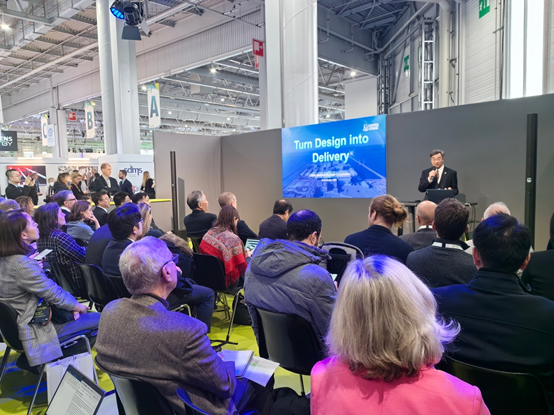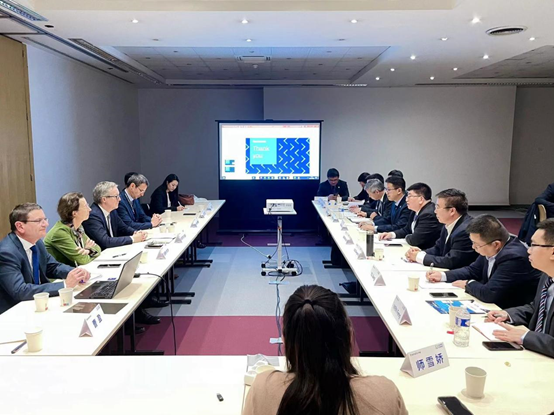
 0 Comment(s)
0 Comment(s) Print
Print E-mail China Report ASEAN, December 1, 2023
E-mail China Report ASEAN, December 1, 2023
"We are all witnesses of the colossal challenge of climate change. In 2022, nuclear energy represented the world's second largest source of low-carbon electricity. Over the past five decades, it has helped avoid the emission of approximately 70 billion tons of carbon dioxide," said Sylvie Bermann, senior French diplomat and France President of the World Nuclear Exhibition (WNE), in WNE2023 which was held in Paris from November 28 to 30 in local time and themed with "Connecting nuclear to the world: rising to the energy and environmental challenges".

At the opening ceremony, Rafael Mariano Grossi, Director General of the International Atomic Energy Agency (IAEA) pointed out: "We see it in Asia, which by far is the leading continent or region in terms of new fields. I was in China just a few months ago to see all these important developments."
WNE is the world's largest civil nuclear industry exhibition. With unprecedented scale and momentum, this exhibition welcomed 650 exhibitors and 20,000 attendees from 76 countries, bringing together industry decision-makers in the world. Seventeen major participants in the global nuclear industry, including China, Canada, South Korea, Japan, the Czech Republic, the United Kingdom, the United States, and France, set up national pavilions at the exhibition. During the event, 130 roundtable forums, keynote speeches, forums, and seminars, as well as 6,000 business talks will be held.
Sylvie Bermann, Rafael Mariano Grossi, Chen Li and Guo Xiaolin, the Minister and the Minister-Counselor of the Chinese Embassy in France respectively, as well as executives of companies such as the EDF Group, Orano, and Westinghouse Electric Corporation, were attracted to visit the China Pavilion and held talks here.

Demonstration of "Chinese Plan"
China has been uninterruptedly building nuclear power plants for four decades, consistently delivering nuclear power services on time and on budget, which is one of a kind in the world. Hualong One is a third-generation nuclear power technology for which China has fully independent intellectual property rights. It adopts a design concept that has a combination of active and passive safety systems, to improve safety and balance economy. It is one of the highly accepted third-generation nuclear power models in the current nuclear power market. In May of this year, the Units 5 and 6 of CNNC's Fuqing Nuclear Power Plant, the world's first Demonstration project to adopt Hualong One passed the completion acceptance, breaking the "the first reactor always delayed" curse of third-generation nuclear power technology in the world.
At a closed-door meeting on the response to the challenges of nuclear energy deployment initiated by Rafael Mariano Grossi, a person in charge of CNNC shared the key practices for the guaranteed delivery of the Hualong One with his peers from other countries, and said that, "CNNC hopes to hold hands with the international community to facilitate the development of the nuclear energy industry and make due nuclear contributions to the address of major challenges such as climate change and the safety of nuclear energy." At the presentation on the delivery capacity of nuclear power services, CNNC took the perspective of project design, construction, management, and other aspects to comprehensively introduce "Chinese Plan" to more than 100 guest experts from all corners of the world.


In addition to expert sharing, the Chinese booth has also attracted visitors from various countries with its innovative charm. For example, a projected nuclear-energy-driven smart city tapped into the connection of the lights of the sand table with seawater and buildings to show the diversified applications of China's nuclear technology achievements, including Hualong One, ACP100, high-temperature gas-cooled reactor (HTGR), fusion reactors, and nuclear medicine, in the fields of power generation, seawater desalination, hydrogen production, and petrochemicals. That's how the group displayed the unlimited possibilities of nuclear energy in future life.
Promotion of Building a Global Community with a Shared Future for Nuclear Energy Development
Since the signing of the first protocol to the agreement between China and France for cooperation in the peaceful uses of nuclear energy in 1982, Sino-French nuclear energy cooperation has emerged as an essential part of the comprehensive strategic partnership between the two countries. Especially the agreements between CNNC and EDF which were signed with the witness of Chinese President Xi Jinping and French President Emmanuel Macron on April 6 have opened a new chapter of nuclear energy cooperation between the two groups.
China and France, both of which have been key players in the global nuclear energy industry, have run a long history of cooperation in the nuclear energy industry and forged a strong bond, which has set a model for the Sino-French technical collaboration. At the Sino-French Nuclear Energy Cooperation and Exchange Seminar held during the Expo, attendees discussed the development of the advanced nuclear energy industry from all aspects, which works as a concrete measure for both countries to deepen the understanding of nuclear energy cooperation under the new climate and a new starting point to embrace the future of the nuclear energy industry.

At the seminar, a representative from CNNC delivered a keynote speech on the development of advanced nuclear energy technology to facilitate the achievement of the "dual-carbon" goals. He introduced the growth of China's nuclear energy industry for the goals, the group's solutions for the comprehensive utilization of nuclear energy, and its outlook on and contribution to the development of the global nuclear energy industry. As a major player in China's nuclear technology industry, CNNC has actively collaborated closely with global partners, including France, continuously expanding high-level open cooperation and pushing forward the building of a global community with a shared future for nuclear energy development.

